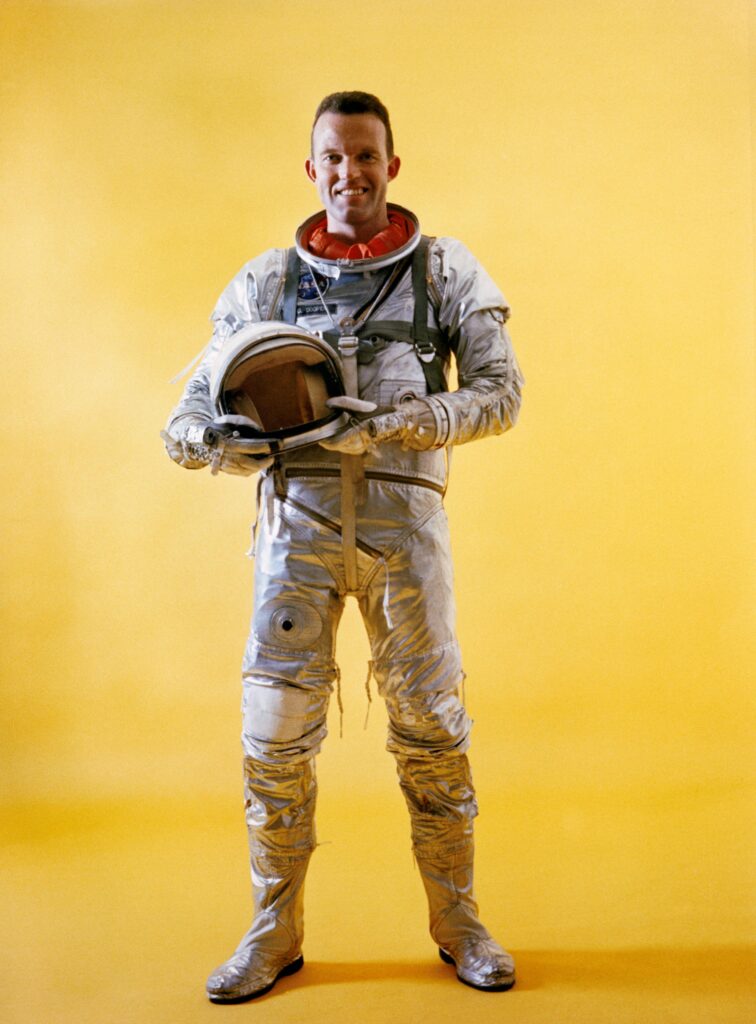Flew the last Mercury mission, longest of program.
Leroy Gordon “Gordo” Cooper, Jr. was born on March 6, 1927, in Shawnee, Oklahoma. His father, a colonel in the US Army Air Corps, took him on his first airplane ride at the age of five. Seven years later “Junior” was flying solo in the family plane. He attended primary and secondary schools in Shawnee and in Murray, Kentucky, where he graduated from high school in 1945. He received a Bachelor of Science degree in Aeronautical Engineering from the Air Force Institute of Technology in 1956, and an honorary Doctorate of Science degree from Oklahoma City University in 1967.
After serving in the Marine Corps from 1945 to 1946, Gordon Cooper enrolled in the University of Hawaii and received an Army commission after completing three years of ROTC in 1949. He transferred his commission to the Air Force, was placed on active duty and given flight training. From 1950 to 1954, he was assigned to the 86th Fighter Bomb Group in Munich, Germany, where he flew F-84 and F-86 jets. He returned to the United States in 1954, and after two years of study at the Air Force Institute of Technology at Wright-Patterson Air Force Base, Ohio received his degree. Cooper then attended the Air Force Experimental Flight Test School at Edwards Air Force Base, California, and upon graduation in 1957, served as an aeronautical engineer and test pilot in the Performance Engineering Branch of the Flight Test Division there. During his Air Force career, Gordon Cooper logged more than 7,000 hours flying time, including over 4,000 hours in jet aircraft.
NASA selected Cooper in 1959 as one of the original seven Mercury astronauts. On May 15 and 16, 1963, he piloted his Faith 7 capsule on the final Project Mercury mission. Cooper tested the Mercury craft to its limits on the 22-orbit, 34-hour flight. During the flight, Faith 7 attained an apogee of 166 statute miles and a speed of 17,546 miles per hour. Cooper traveled 546,167 statute miles, the longest distance achieved by an American astronaut at that time. Electrical problems near the end of the mission meant he had to manually fire his retrorockets and steer the capsule through re-entry.
Problems also beset Gordon Cooper on his next flight, a then-record eight-day trip aboard Gemini V, from August 21 to 29, 1965. Accompanied by Pilot Charles Conrad, Command pilot Cooper had trouble with fuel supplies, power systems, and a computer-generated command, which caused Gemini V to land 103 miles short of its landing target. But he and Conrad demonstrated that astronauts could resolve problems and they stayed aloft the full duration. They also established a new space endurance record by traveling 3,312,993 miles in 190 hours and 56 minutes. Cooper became the first man to orbit the Earth on two separate occasions and won for the United States the lead in man-hours in space by accumulating a total of 225 hours and 15 minutes. In his two missions, he spent 9.39 days in outer space.
Colonel Gordon Cooper retired from both NASA and the Air Force in 1970 after being passed over for the command of Apollo 13. He then served on the boards of directors as a technical consultant to a number of companies in the aerospace, electronics and energy fields. He also was the vice president for research and development for Walt Disney Enterprises from 1974 to 1980. In 1989 he became chief executive officer of Galaxy Group, Inc., an engineering design group engaged in modifying existing aircraft and designing and manufacturing new aircraft.
Among Cooper’s awards are the Air Force Legion of Merit, the Air Force Distinguished Flying Cross, the Air Force Distinguished Flying Cross Cluster, the NASA Exceptional Service Medal, the NASA Distinguished Service Medal, USAF Command Astronaut Wings, the Collier Trophy, the Harmon Trophy, the Ivan E. Kincheloe Trophy, The Air Force Association Trophy, and the Association of Aviation Writers Award.
Colonel Cooper wrote a book, Leap of Faith, about his career in the Air Force and NASA as well as his efforts to expose what he termed an alleged UFO cover-up conspiracy. After contracting Parkinson’s disease, Gordon Cooper died on October 4, 2004, at the age 77, in Ventura, California.

